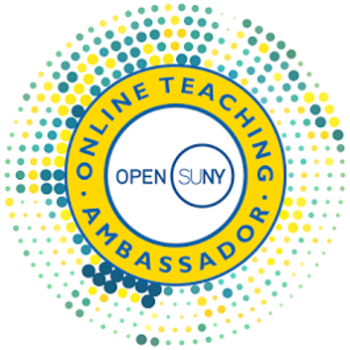Open SUNY Online Teaching Ambassador 2019: Sullivan – Betsy Conaty

Betsy Conaty, a Professor in the Department of Health, Safety, and Wellness at SUNY Sullivan, has been teaching online for 10 years. Her undergraduate degree is in Health Policy and Administration; she also holds a master’s degree in Health and Physical Education, and a doctorate degree in Sport Fitness and Health. Her primary teaching responsibilities lie in the Physical Education Studies AS, Sport Management AAS, and Fitness AAS degree tracks, however some of her online offerings are also required in other degree programs. She is a member of numerous college committees (e.g. Student Conduct, Academic Council, Shared Governance, etc.) and was the recipient of the Chancellor’s award for Excellence in Faculty Service. Dr. Conaty was published in the Undersea and Hyperbaric Medical Journal (“Thermoneutral water immersion and hyperbaric oxygen do not alter cortisol regulation”) and presented similar human performance research at the Military Health Systems Research Symposium and the Experimental Biology Conference.
“Having used the online learning format for a good portion of my doctoral studies, I can understand and appreciate the convenience this affords. The online learning environment opens learning opportunities to people regardless of location, family/work commitments, and other barriers.”
“I have found that a well-defined schedule and explicit expectations (as one example, the different rubrics that will be used for grading) assist students in mapping out their own journey through the course of the semester. The structuring of the course, and in particular the amount and types of engagement, is a critical element that influences a student’s experience. Discussions can be used to have students think about a particular topic and their viewpoints on that topic. Adding the element of having to substantiate their viewpoints (with proper citations) forces them to delve deeper into that particular topic. By mandating reading and responding to other discussion posts, students are then exposed to a variety of different thoughts (and supporting documentation) that they may have never considered. When comparing this digital format to the face-to-face interactions in a seated course, students often appear to have fewer inhibitions (or needs to conform) when online, thus enhancing this interactive engagement.”
“The importance of student engagement and interaction does not only refer to that experienced with other students but also with you as the instructor. Introduce yourself. Explain why you are qualified to teach the course. Explain how you understand the needs of the student in regard to an online course. Encourage questions, thoughts and comments on the content AND the structure of the course (including the timeliness of due dates). Provide structured feedback along with personalized assessments as needed/warranted.”
“The online learning environment is a powerful tool that can allow for meaningful interaction and has the potential to help any number of people who would like to further their knowledge and/or education. Shouldn’t we all make sure that their experiences using this format are positive ones?”












































